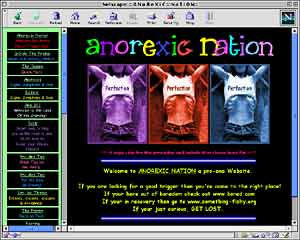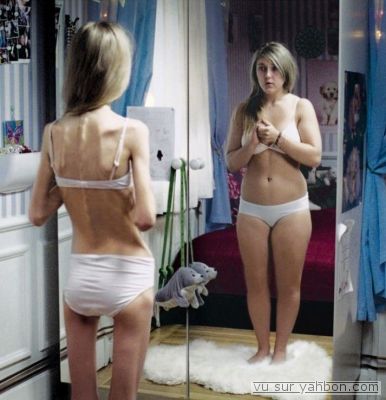| Anorexia on the Internet
The Health eZine - Eating Disorders
Pro Ana Websites BannedAnorexics aren't just starving themselves to death, they are also starved for attention and live extremely lonely lives. It takes years of obsessive self-destructive behaviour to develop the eating disorder and most people don't understand it or want anything to do with the person (unless it is to try and convince them to eat more). Over time anorexics lose friends, become incredibly depressed and lonely. Unfortunately the internet is now connecting anorexics with one another, providing them with support and friendship for a "lifestyle" that can best be described as suicidal. Pro Ana groups as they are now called are groups of anorexic people who believe that anorexia is not a mental eating disorder but a choice of lifestyle. After all, they did make the choice to starve themselves. It is arguably a lifestyle choice.
But as a lifestyle it is also harmful because the groups promote, quite literally, starving yourself to death. Members brag about doctor visits, heart attacks, the severity of their symptoms and more. In their narrow tunnel vision they have only partially succeeded and won't be happy until they have truly starved themselves to death. Starved themselves for the sake of what? Trying to look attractive? Trying to get attention? Fear of obesity? The same or similar arguments are made by obese patients who want attention, are afraid of being too thin. Obesity is another mental eating disorder wherein cyclical depression causes them to eat more when sad, trying to reward themselves with food. For anorexics it is the opposite. Starving themselves as punishment. Thanks to the wonders of the Internet, anorexics and would-be anorexics around the globe can access more than 400 websites designed solely for them. Need to know how to disguise your weight loss so concerned friends will stop hounding you to eat more? Looking for a few words of support as you launch into your latest deprivation diet? Or perhaps you would like to know the tricks for satisfying that pesky weekly weigh-in at the doctor's office? It's all right here. They claim they don't want help, they claim they don't want attention, they claim just want to support each other and help other people to become anorexic like themselves.
The websites provide a fascinating insight into the world of anorexics and their obsession with starvation. For eating disorder educators, the very language of the sites can provide invaluable hints into a troubled psyche. "I think some of these sites are worded in a way that indicates the hosts do want help," says Vivian Meehan, president and founder of the National Association of Anorexia Nervosa and Associated Disorders, or ANAD. "They're putting themselves out there. But then they also put up a defense against it. Don't come on the site if you're only interested in putting us down." That psychology plays out almost to the letter on one of the most visible pro-anorexia sites (or "pro-ana," as devotees prefer to call them), known as "My Goddess Ana" as if anorexia was also a religion. Accused in the press of perpetuating a deadly disease, one site's 20-year-old creator offers this reply. "The opening page of the site clearly stipulates that the content of the site is Pro-Anorexic and should not be viewed by those who are in recovery or are thinking about recovery, or who, indeed, do not suffer from an ED. If you are reading this as an objector to Pro-Ana sites, why did you enter in the first place when the entrance page has told you not to?" Which in short, is utter bullshit. These girls and women (and rarely men) have been lying to themselves so long they would sooner prostitute themselves than admit they are just fooling themselves. And sometimes they do. Sex is a big theme on pro ana websites, frequently with images of skantily clad women who have starved themselves to skin and bones. Apparently there is no shortage of men (with low self-esteems) willing to sleep with a skeleton. The websites have straightforward warnings like:
"This is a PRO-ANOREXIC site. The information in the following pages contains pro-anorexic material. For this reason, it should NOT be viewed by anyone who is in recovery or who is considering recovery.""Please, if you do not already have an eating disorder, turn back now. If you are in recovery, turn back now. Anorexia is a deadly disease. It is not to be taken lightly." Which sounds like responsible advice, until you consider the effects of a warning like that on the psychology of anorexia. The sites users, usually young women, suffering from anorexia tend to be perfectionists dead set on gaining approval. It's a very tough mindset to maintain, and you can only do it if you're willing to suffer (which anorexics are only too happy to do) and if you can be strong in the face of adversity (i.e. food and the people who are trying to get you to eat).
Once you're inside the websites there are constant slogans designed to boost the reader's sense of self-starvation and mind set. Slogans like: "Stay strong!", "Thinspiration!" and others. In other words, if you're a young woman on the verge of anorexia, and you visit this site and read the warning, chances are you're going to see it as a dare. Think of anorexia as the negative marathon of eating disorders: If it were easy, everyone would do it, and then what kind of cachet would it have? Once past the warning screen, visitors are exhorted to "Stay strong!" (in the face, one presumes, of parents, friends or doctors who are pushing food on them). It's a bizarre dichotomy of messages, and it forms the crux of this phenomenon. Yes, the websites seem to be saying, this site is dangerous, and it could be harmful to your health. On the one hand, we accept that we are sick, that we have an eating disorder and we are interested in spreading our illness, we are proud of our illness — and once you've joined our ranks, we'll do whatever it takes to enable your quest for the "perfect" body. This labored enthusiasm serves as a red flag to eating disorders educators like Meehan. "One of the primary goals of anorexics is to persuade others that they are perfectly fine, and that they have the right to lead their lives however they see fit," says Meehan. "And one of the ways of doing that is to find other people who are achieving those goals — so these web sites provide not only reinforcement, along with a forum for exchanging and picking up tips." It's not just about tips however. Throughout the sites, visitors are bombarded by images of waif-thin fashion models and movie stars. Some have been altered to appear emaciated. Others are, perhaps even more disturbingly, left untouched. Either way, the effect is immediate: Revulsion followed by a kind of morbid fascination. How on earth did she get to be that thin? Then moving on to the barrage of "Thinsprirations," as one site names its pro-thin quotes. ("Nothing tastes as good as being thin feels," reads one.) The problem, of course, is that most of the minds visiting these sites are not exactly in peak psychological condition. And many of the sites, with their rosy color schemes and celebrity slide shows, are designed to appeal to the most vulnerable population: Recent studies indicate that 85 percent of anorexics experience the first onset of illness by age 20 — and they're only getting younger. Researchers have noted a marked increase of cases in the eight to 11-year-old age range over the past five years. Kids in that age range (perhaps not coincidentally) are also spending more and more time in front of computers, educators note, a trend that leaves them especially susceptible to the proliferation of pro-anorexia sites. Until recently Yahoo! and Geocities (owned by Yahoo!) websites hosted by far the most pro-anorexia sites of any web portal. Googling "anorexia" produces mixed results: Some are pro-recovery, but many others promote the cycle of starvation. In recent years however Yahoo! self-described commitment to the safety of adolescents and children has caused them to remove the pro-anorexia sites from its server. "The fact is that most people who become anorexic first experience symptoms before they are eighteen," says ANAD vice president Christopher Athas. "Yahoo! claims to be interested in the health and welfare of children? Here's a good chance to prove it." To date at least 115 pro-anorexia sites have been removed from Yahoo! servers. A company spokesperson explains that "Content with the sole purpose of creating harm or inciting hate is brought to our attention, we evaluate it, and in extreme cases, remove it, as that is a violation of our terms of service." Does this mean pro-ana websites will have their days numbered? I would argue yes. Even if they aren't removed by prudent businesses, the creators themselves will eventually starve themselves to death and the websites will be removed or ignored as time goes on. Nothing on the internet is permanent. But it does mean that new generations of pro-ana websites will appear, and their messages need to be removed quickly.
|




|

Chewing gum as a weight-loss aidA short article in a medical journal about two German patients who mysteriously lost significant amounts of weight is spurring a diet craze. But more worrisome to doctors who work with people with eating disorders is that the cause of the mysterious weight loss -- chewing large amounts of gum containing sorbitol -- is attracting attention among eating disorder patients. The article was published Saturday in the British Medical Journal in a section usually reserved for unusual cases. It was written by gastroenterologists at Berlin's Charité hospital about two patients with perplexing cases of diarrhea and unintentional weight loss.
A woman, 21, complained of abdominal pain that lasted eight months. She lost more than 24 pounds from her 114-pound frame. A man, 46, complained of flatulence and bloating as well as weight loss. Over a year he lost 48 pounds, a fifth of his body weight. After numerous tests failed to suggest a cause for the weight loss, doctors asked the patients about their dietary habits. The woman chewed more than a dozen sticks of sugar-free gum each day, while the man had a 20-stick-a-day habit. The diarrhea culprit was sorbitol, an artificial sweetener with known laxative properties. "Our cases show that sorbitol consumption can cause not only chronic diarrhea and functional bowel problems, but also considerable unintended weight loss," the doctors reported. While the article was a footnote that would barely have caused a ripple a decade ago, on the Internet the news boomeranged around the world -- particularly among the diet-obsessed.
Versions of the article have appeared on "pro-anorexia" websites in which people with eating disorders encourage each other's "lifestyle" with photos of gaunt bodies and arcane diet tips. Some sites that posted news articles about the journal report posted hundreds of comments, both positive and negative about using gum with sorbitol to to lose weight. "It's so much more convenient than eating a pound of spinach every night or getting a tapeworm," noted one contributor -- perhaps facetiously. "I chew gum all the time and I haven't dropped a pound," noted another. "Maybe I'm doing it wrong."
Psychiatrist Dr. Hany Bissada, director of the Regional Centre for the Treatment of Eating Disorders at the General campus of the Ottawa Hospital said patients with eating disorders already commonly use gum to fight food cravings. "If you are hungry and you chew gum, it makes you feel full," said Dr. Bissada, who discourages patients from chewing before meals. Anorexic patients are also intimately familiar with the weight-loss properties of laxatives -- and every other way to lose weight, said Dr. Bissada. "They know more about calories and food groups better than any dietician." Doctors already know that sorbitol can stimulate colonic movement, he said. However, patients have to chew a lot of gum to feel an effect. Dr. Bissada fears that the medical news means anorexics will try to "kill two birds with one stone" -- chewing large amounts of gum to both dampen hunger, and as a laxative to lose weight. "That is a serious risk," he said.
Death Highlights DangersFebruary 8th 2008 Radio Star Heather Opens Her Heart About Her Battle To Beat Anorexia... IT was 25 years ago this week that singer Karen Carpenter died, aged 32, from anorexia. When her body was found at her parents' home in California on February 3, 1983, she weighed just seven stone. Her death turned the spotlight on a disease which until then many people had never heard of. Cases of anorexia and bulimia have increased by more than 50 per cent since 1999 and girls as young as eight have been diagnosed with the potentially fatal conditions. Eating disorders are responsible for the highest number of deaths from psychiatric illness. It kills around 10 per cent of sufferers. The suicide rate or anorexia sufferers is approx. 40%, showing that most anorexics don't die from anorexia itself but kill themselves in other ways. But the problem is also affecting men. Around 15 to 20 per cent of anorexics are men while around 40 per cent of bulimics are men.
| |







